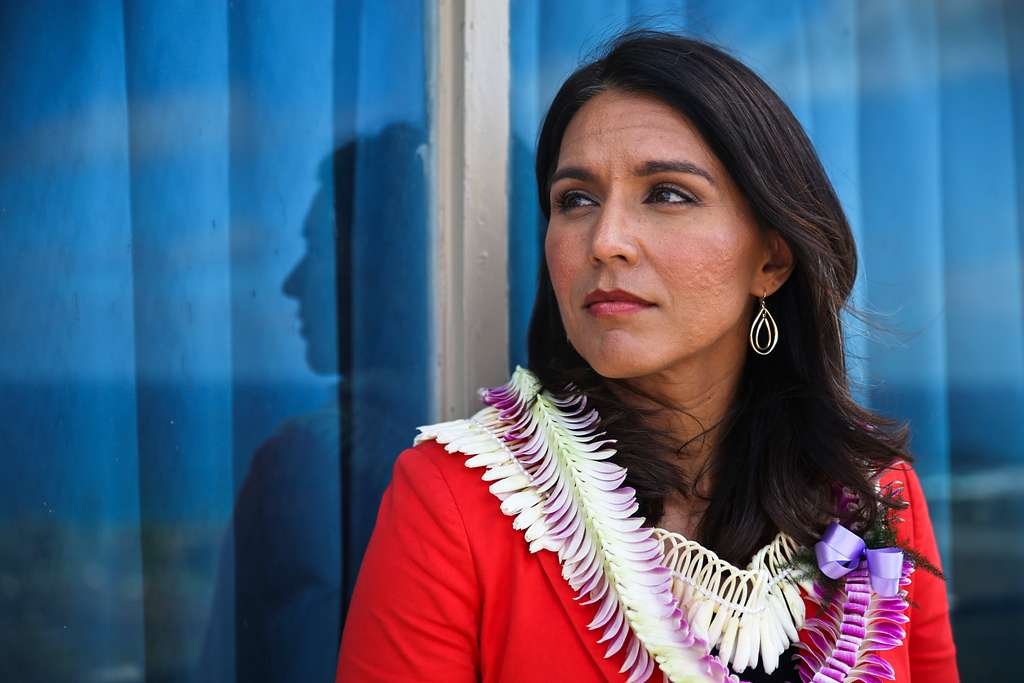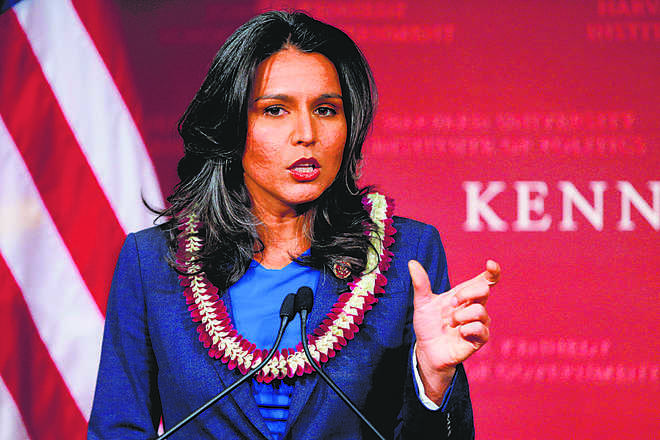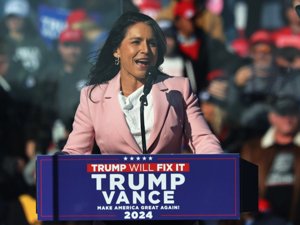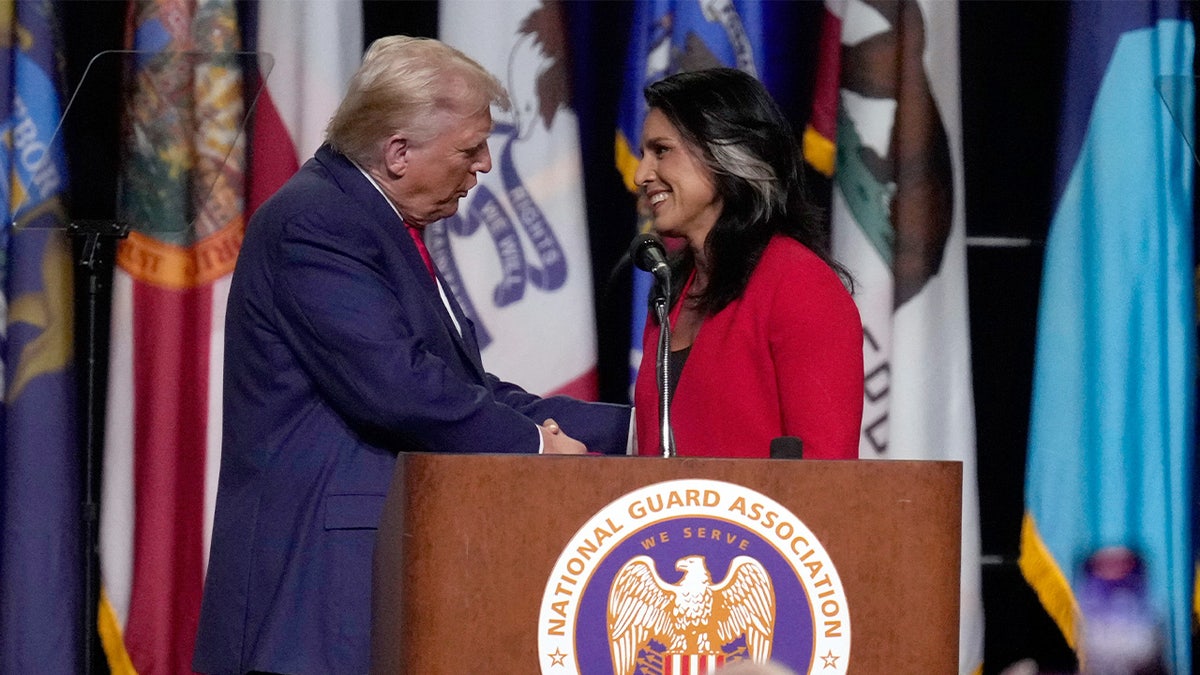
Table of Contents
Curious about Tulsi Gabbard?

Img Credit: https://images.tribuneindia.com/cms/gall_content/2019/1/2019_1$largeimg13_Sunday_2019_064927748.jpg
Tulsi Gabbard, a former Democratic congresswoman who transitioned to the Republican Party, has been nominated by President-elect Donald Trump as the next Director of National Intelligence, a decision that has sparked debate due to her unconventional political journey, anti-interventionist stance, and lack of traditional intelligence experience, raising concerns among intelligence professionals and allies about potential shifts in U.S. intelligence priorities.
Born in American Samoa and raised in Hawaii, Gabbard’s background is as diverse as her political career. At 43 years old, Gabbard has packed a lifetime of experiences into her career. She made history as the first Hindu elected to Congress, bringing a unique perspective to American politics. Her spiritual background has influenced her approach to governance, often emphasizing peace and diplomacy in her policy positions.
Gabbard’s military service forms a cornerstone of her identity. As a veteran who served for more than two decades, including deployments to Iraq and Kuwait, she brings firsthand experience of war to her political views. This military background has heavily influenced her anti-interventionist stance on foreign policy.
In Congress, Gabbard represented Hawaii’s 2nd district from 2013 to 2021, building a reputation as a maverick Democrat willing to challenge party orthodoxy. Her tenure was marked by vocal opposition to U.S. military interventions abroad and criticism of her own party’s foreign policy positions. Gabbard’s presidential run in 2020 as a Democrat brought her national attention, though her campaign was ultimately unsuccessful. During this time, she gained notoriety for her sharp debates with other candidates, including then-Senator Kamala Harris.
Her political evolution has been dramatic and controversial. After leaving the Democratic Party in 2022, Gabbard became an independent before aligning herself with the Republican Party and Donald Trump. This shift has been seen by some as a principled stand against what she views as an “elitist cabal” controlling the Democratic Party, while critics view it as political opportunism.
Gabbard’s positions on issues like Syria, Russia, and domestic policies have often put her at odds with mainstream political thought. Her meeting with Syrian President Bashar al-Assad in 2017 and her skepticism about U.S. involvement in Ukraine have been particularly contentious. Now, as Trump’s nominee for Director of National Intelligence, Gabbard stands poised to potentially reshape America’s intelligence apparatus. This nomination marks a significant departure from traditional appointments, as Gabbard lacks the typical intelligence background of past officeholders. Throughout her career, Gabbard has remained a polarizing figure, admired by supporters for her willingness to challenge the status quo and criticized by detractors for her unorthodox positions and political shifts. As she steps into this new role, the impact of her unique background and perspectives on U.S. intelligence operations remains to be seen.
Tulsi’s Unconventional Politics

Tulsi Gabbard’s political career is like a game of hopscotch where she’s constantly jumping between squares, breaking the traditional rules as she goes. Her unique approach to politics has left both allies and opponents scratching their heads, wondering what move she’ll make next.
One of Gabbard’s most striking characteristics is her willingness to buck party lines. While many politicians stick to their party’s script like it’s the lyrics to their favorite karaoke song, Gabbard has been known to improvise. During her time as a Democrat, she often clashed with party leadership, particularly on foreign policy issues. It’s as if she was playing for the blue team but occasionally scoring points for the red one.
Gabbard’s foreign policy views have been a particular source of controversy. She’s like a dove in a hawkish henhouse, consistently advocating for non-intervention and diplomacy over military action. Her 2017 meeting with Syrian President Bashar al-Assad raised eyebrows higher than a cartoon character’s, with critics accusing her of legitimizing a dictator and supporters praising her willingness to engage in dialogue.
On domestic issues, Gabbard has also zigged where others have zagged. She’s supported progressive policies like Medicare for All and action on climate change, but has also taken more conservative stances on issues like gun control. It’s as if she’s assembling a political platform using pieces from different jigsaw puzzles. Gabbard’s approach to media and public perception is equally unconventional. She’s been a frequent guest on conservative media outlets, even while serving as a Democratic congresswoman. This willingness to engage with ideological opponents has made her a political unicorn in an era of increasing polarization.
Her recent shift to the Republican Party and alignment with Donald Trump is perhaps the most dramatic example of her norm-breaking approach. It’s like watching a plot twist in a political thriller – unexpected, controversial, and guaranteed to keep people talking. Gabbard’s unique approach extends to her communication style. She’s known for her direct, often blunt statements, calling out what she sees as hypocrisy or corruption in both parties. It’s as if she’s playing a game of political whack-a-mole, ready to take a swing at any target that pops up, regardless of party affiliation.
This willingness to break norms has made Gabbard a polarizing figure. To her supporters, she’s a breath of fresh air in a stale political environment, unafraid to speak truth to power. To her critics, she’s an unpredictable loose cannon, potentially compromising national security with her unorthodox views. As Gabbard steps into her new role as Director of National Intelligence, her norm-breaking approach is likely to face its biggest test yet. The intelligence community, with its established protocols and procedures, is about to get a shake-up that could be as dramatic as adding pop rocks to a soda. Whether this will lead to a refreshing new perspective or a messy explosion remains to be seen.
Key milestones of Tulsi Gabbard’s career

Tulsi Gabbard’s career has been a rollercoaster ride of unexpected twists and turns. Let’s take a look at some of the key moments that have shaped her journey:
- In 2002, at just 21 years old, Gabbard became the youngest person ever elected to the Hawaii State Legislature. This was like a rookie baseball player hitting a home run in their first at-bat – it put her on the political map early.
- Gabbard’s military service has been a defining part of her career. In 2004, she voluntarily stepped down from public office to serve in a war zone with the Hawaii Army National Guard. This decision was like a firefighter running into a burning building – it showed her commitment to service.
- In 2012, Gabbard made history by becoming the first Hindu member of Congress and the first Samoan-American voting member of Congress. This was akin to breaking through a glass ceiling with a sledgehammer – it opened doors for greater diversity in American politics.
- During her time in Congress, Gabbard served on the House Armed Services and Foreign Affairs committees. This experience was like getting a front-row seat to some of the most critical national security discussions.
- In 2016, Gabbard made waves by resigning as Vice Chair of the Democratic National Committee to endorse Bernie Sanders for president. This move was like a plot twist in a political drama – unexpected and controversial.
- Gabbard’s 2017 meeting with Syrian President Bashar al-Assad was a pivotal moment in her career. This controversial decision was like walking a tightrope without a safety net – it drew both praise and harsh criticism.
- In 2019, Gabbard launched her own bid for the Democratic presidential nomination. While unsuccessful, this campaign was like a coming-out party for her unique brand of politics on the national stage.
- October 2022 marked another significant shift when Gabbard left the Democratic Party, citing disagreements on foreign policy and social issues1. This was like a star player switching teams mid-season – it shocked many observers.
- In a surprising move, Gabbard endorsed Donald Trump for the 2024 presidential election in August 2024. This endorsement was like a plot twist in a political thriller – unexpected and game-changing.
- Finally, in November 2024, Trump selected Gabbard to serve as the Director of National Intelligence in his second term. This appointment was like casting an unconventional actor in a leading role – it signaled a potential shake-up in the intelligence community.
Each of these moments has contributed to Gabbard’s unique political trajectory, making her one of the most intriguing and controversial figures in modern American politics.
Gabbard’s Shift from Democrat to Republican

Image Credit: Fox News
Tulsi Gabbard’s political journey is like a rollercoaster ride that’s left many people scratching their heads. Here’s the scoop on her shift from Democrat to Republican:
- Gabbard started as a rising star in the Democratic Party, representing Hawaii in Congress for eight years.
- She even ran for the Democratic presidential nomination in 2020, debating future Vice President Kamala Harris.
- But in 2022, Gabbard shocked everyone by leaving the Democratic Party, saying it was now controlled by an “elitist cabal.”
- She didn’t immediately join the Republicans, instead becoming an independent.3
- Gabbard’s views started aligning more with Trump and his GOP allies, especially on foreign policy and cultural issues.
- In a plot twist worthy of a political drama, Gabbard officially joined the Republican Party in October 2024.
- She even became a Trump campaign surrogate, helping him prep for debates and speaking at his rallies.
This political about-face has been like watching a magic trick. One minute Gabbard was a Democrat, the next she’s a “proud Republican,” as Trump put it.1 Her transformation highlights the increasingly blurry lines between parties in American politics. Gabbard’s critics say she’s an opportunist, while her supporters argue she’s following her principles. Either way, her journey from Democratic presidential hopeful to Trump’s pick for intelligence chief is a head-spinning example of how quickly political allegiances can change in today’s polarized landscape.
Tulsi’s Controversial Moments
Image Credit: Insider.com
Tulsi Gabbard’s political career has been peppered with controversies and criticisms, like a spicy dish that leaves some people reaching for water. Her unorthodox positions and shifting allegiances have made her a lightning rod for debate.
One of the most significant controversies surrounding Gabbard is her stance on Syria. Her 2017 meeting with Syrian President Bashar al-Assad raised eyebrows across the political spectrum. Critics accused her of legitimizing a dictator, while Gabbard defended the meeting as a step towards peace. This move was like inviting the school bully to your birthday party – it left many people confused and upset.
Gabbard’s views on LGBTQ+ rights have also been a source of contention. Early in her career, she opposed same-sex marriage and worked for an anti-gay organization run by her father. While she has since apologized and changed her stance, this flip-flop has been like trying to erase permanent marker – the traces of her past positions remain visible.
Her comments on Russia and Ukraine have drawn sharp criticism. Gabbard has suggested that the U.S. and NATO share blame for the conflict in Ukraine, a position that aligns more closely with Russian narratives than with mainstream U.S. foreign policy.
This stance is like wearing the opposing team’s jersey to a home game – it’s bound to ruffle some feathers.Gabbard’s appearances on conservative media outlets, even while serving as a Democratic congresswoman, have been another point of controversy. Her frequent criticism of the Democratic Party on these platforms has been seen by some as betrayal, like a family member airing dirty laundry in public. Her shift from the Democratic Party to supporting Donald Trump has been perhaps her most controversial move yet. This political about-face has led to accusations of opportunism and inconsistency.
It’s like watching a vegetarian suddenly become a steak enthusiast – it leaves many wondering about the sincerity of her convictions. Gabbard’s lack of traditional intelligence experience has become a major point of criticism following her nomination as Director of National Intelligence. Intelligence professionals and allies have expressed concern about her qualifications for the role. This appointment is like putting a novice driver behind the wheel of a Formula 1 car – it’s seen as risky and potentially dangerous. Her past comments on foreign policy, particularly her skepticism about U.S. interventions abroad, have led to accusations that she’s too sympathetic to authoritarian regimes. This perception is like having a “Handle with Care” sticker on your political reputation – it makes people wary of trusting her with sensitive intelligence matters.
Critics have also pointed to Gabbard’s promotion of conspiracy theories, including unfounded claims about U.S.-funded biolabs in Ukraine. This tendency to amplify controversial narratives is like playing with matches in a room full of dynamite – it’s seen as potentially destabilizing for someone in a high-level intelligence position. Despite these controversies, Gabbard maintains a base of supporters who view her as a principled maverick willing to challenge the status quo. However, as she steps into her new role, these controversies are likely to follow her like a persistent shadow, influencing perceptions of her leadership and decision-making in the intelligence community.
Gabbard’s Role in Trump’s Intelligence Strategy
Tulsi Gabbard’s nomination as Director of National Intelligence (DNI) is like Trump playing a wild card in a high-stakes poker game. Here’s how she fits into his intelligence strategy:
- Trump’s choice of Gabbard signals a potential shake-up in the intelligence community, akin to bringing a maverick pilot into the cockpit of a jumbo jet.
- By selecting someone without traditional intelligence experience, Trump is prioritizing loyalty and ideological alignment over conventional qualifications. It’s like choosing a passionate amateur chef to run a Michelin-starred restaurant.
- Gabbard’s appointment could be seen as Trump’s attempt to rein in what he perceives as a “deep state” within intelligence agencies. It’s as if he’s sending in a new sheriff to clean up Dodge City.
- Her anti-interventionist stance aligns with Trump’s “America First” policy, potentially shifting intelligence priorities away from global engagement and towards domestic concerns. This could be like changing the focus of a telescope from distant galaxies to our own solar system.
- Gabbard’s skepticism towards U.S. involvement in Ukraine and her perceived pro-Russia stance might lead to a reassessment of intelligence operations related to Eastern Europe. It’s akin to changing the rules of a chess game mid-match.
- Her controversial meetings with Syrian President Bashar al-Assad suggest a willingness to engage with adversaries, which could alter how intelligence is gathered and used in diplomatic efforts. This approach is like trying to befriend the school bully instead of confronting them.
- Trump’s choice of Gabbard could be seen as an attempt to bridge political divides, given her background as a former Democrat. It’s like casting a method actor known for villainous roles as the hero in a blockbuster movie.
- The nomination has raised concerns among allies, particularly in the Five Eyes intelligence alliance, about potential changes in intelligence sharing. This is similar to changing the secret handshake in an exclusive club without telling all the members.
This strategic move by Trump is like reshuffling the deck in a game of international intelligence. While it could lead to fresh perspectives and approaches, it also risks alienating traditional allies and disrupting established intelligence norms. The ultimate impact of Gabbard’s role will depend on how she navigates the complex world of national security and intelligence gathering.
Gabbard’s Lasting Influence
Image Credit: USA Today
Tulsi Gabbard’s political journey has left an indelible mark on American politics, like a bold brushstroke on a canvas. Her legacy is a complex tapestry of contradictions and unconventional choices that have both inspired and confounded observers across the political spectrum.
Gabbard’s impact on foreign policy discourse has been significant. Her vocal opposition to U.S. military interventions abroad has challenged the status quo, forcing conversations about America’s role on the global stage. Like a pebble thrown into a pond, her anti-war stance has created ripples that have reached both progressive and conservative circles.
Her willingness to break party lines and engage with ideological opponents has set her apart in an era of increasing polarization. Gabbard’s approach is akin to a tightrope walker crossing the Grand Canyon – risky, attention-grabbing, and potentially groundbreaking. This maverick style has earned her both ardent supporters and fierce critics.
Gabbard’s political evolution from rising Democratic star to Trump-aligned Republican has become a case study in the fluidity of modern political identities. Her journey is like a choose-your-own-adventure book, where each decision leads to unexpected plot twists. This transformation has sparked debates about political consistency and the nature of party loyalty in the 21st century.
As the first Hindu member of Congress and a woman of color in high-profile political roles, Gabbard has undeniably expanded representation in American politics. Her presence has been like opening a window in a stuffy room, allowing fresh perspectives to enter the national conversation.
Her appointment as Director of National Intelligence, despite lacking traditional intelligence experience, may prove to be her most impactful legacy yet. This role puts Gabbard at the helm of America’s intelligence apparatus, potentially reshaping how the country gathers and uses critical information. It’s like handing the keys of a high-tech sports car to a driver known for taking the road less traveled.
Ultimately, Tulsi Gabbard’s impact on American politics is akin to a Rorschach test – what people see in her career often reveals as much about their own political beliefs as it does about Gabbard herself. Whether viewed as a principled maverick or an opportunistic shape-shifter, there’s no denying that Gabbard has left an indelible mark on the political landscape, challenging conventional wisdom and forcing Americans to reconsider their assumptions about party loyalty, foreign policy, and the very nature of political identity.
Frequently Asked Questions
Q: What is Tulsi Gabbard’s current political affiliation?
A: As of November 2024, Tulsi Gabbard is a member of the Republican Party. She officially joined the GOP in October 2024 after leaving the Democratic Party in 2022 and briefly being an independent.
Q: What is Gabbard’s military background?
A: Gabbard served in the Hawaii Army National Guard for over 20 years. She deployed to Iraq in 2004-2005 and to Kuwait in 2008-2009. She currently holds the rank of Lieutenant Colonel in the U.S. Army Reserve.
Q: What experience does Gabbard have in intelligence matters?
A: Gabbard has limited direct intelligence experience. She served on the House Armed Services and Foreign Affairs committees during her time in Congress, but was never a member of the House Intelligence Committee.
Q: Why is Gabbard’s nomination as Director of National Intelligence controversial?
A: Her nomination is controversial due to her lack of traditional intelligence experience, her past meetings with Syrian President Bashar al-Assad, her perceived pro-Russia stance, and her dramatic shift from the Democratic to Republican party.
Q: What are some of Gabbard’s key foreign policy positions?
A: Gabbard is known for her anti-interventionist stance. She has opposed U.S. involvement in Syria, criticized U.S. support for Ukraine against Russian aggression, and called for dialogue with adversarial nations.
Q: Has Gabbard held any other significant political positions?
A: Yes, Gabbard served as a U.S. Representative for Hawaii’s 2nd congressional district from 2013 to 2021. She was also a member of the Hawaii House of Representatives from 2002 to 2004 and ran for the Democratic presidential nomination in 2020.
Q: How has Gabbard’s political ideology evolved over time?
A: Gabbard has shifted from being a progressive Democrat to aligning more closely with conservative positions. She has changed her stance on issues such as LGBTQ+ rights and has become increasingly critical of the Democratic Party’s foreign policy and social positions.